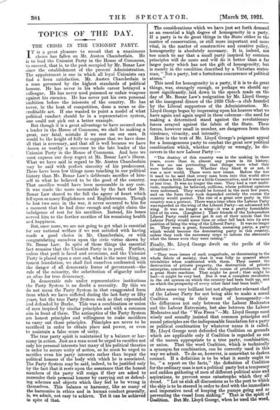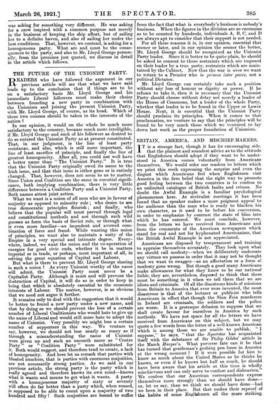TOPICS OF THE DAY.
THE CRISIS IN THE UNIONIST PARTY.
IT is a great pleasure to record that a unanimous choice has fallen on Mr. Austen Chamberlain. He is to lead the Unionist Party in the House of Commons, to succeed, that is, to the post occupied by Mr. Bonar Law since the establishment of the present Administration. The appointment is one in which all loyal Unionists can find a keen satisfaction. Mr. Austen Chamberlain is a man governed by the highest standards of political honour. He has never in his whole career betrayed a colleague. He has never used poisoned or unfair weapons against his enemies. He has never put his own personal ambition before the interests of the country. He has never, in the heat of competition, done a mean or dis- creditable act. If one wanted to point a model of what political conduct should be in a representative system, one could not pick out a better example. But though it is a great advantage to have secured such a leader in the House of Commons, we shall be making a great, nay fatal, mistake if we rest on our oars. It would be the height of folly to suppose that we have done ill that is necessary, and that all is well because we have 3hosen so worthy a successor to the late leader of the Unionist Party in the House of Commons. And here we must express our deep regret at Mr. Bonar Law's illness. What we have said in regard to Mr. Austen Chamberlain may be said with perfect sincerity of his predecessor. There have been few things more touching in our political history than Mr. Bonar Law's deliberate sacrifice of him- self to what he believed to be the good of the country. That sacrifice would have been memorable in any case. It was made the more memorable by the fact that Mr. Bonar Law shared to the full the agony of heart which fell upon so many Englishmen and Englishwomen. Though he lost two sons in the war, it never occurred to him for a moment that he had done enough and might claim the indulgence of rest for his sacrifices. Instead, his losses nerved him to the further sacrifice of his remaining health and happiness.
But, once more, we are not going to get what is essential for our national welfare if we rest satisfied with having • made a good choice in Mr. Chamberlain, or with congratulating ourselves upon the civic virtue shown by Mr. Bonar Law. In spite of these things the essential fact remains that the Unionist Party is in peril. Further, unless that peril is faced and overcome, and the Unionist Party is placed upon a sure and, what is the same thing, an honest foundation, we shall find ourselves confronted with the danger of all democratic forms of government—the rule of the minority, the substitution of oligarchy under an alias for true democracy. In democratic rule under representative institutions the Party System is no doubt a necessity. By this we do not mean the Party System in that exaggerated form from which we have suffered during the last forty or fifty years, but the true Party System such as that expounded and defended by Burke. This was a• combination or union of men inspired by similar principles and with a common aim in front of them. The antiseptics of the Party System are honest principles and willingness to make sacrifices to carry out those principles. Principles are never to be sacrificed in order to obtain place and power, or even to maintain a false sense of unity.
The true party spirit is maintained by a balance or har- mony in action. Just as a man must be urged to sacrifice not only his personal interests but many of his political theories in order to secure unity of action, so he must be urged to sacrifice even his party interests rather than impair the political honour of the body with which he is associated. The Party System may be said, indeed, to be justified only by the fact that it rests upon the assurance that the honest members of the party will resign if they are asked to surrender their personal honour by carrying out or defend- ing schemes and objects which they . feel to be wrong in themselves. This balance or harmony, like so many of the harmonies in ethics and in human conduct generally, is, we admit, not easy to achieve. Yet it can be achieved in spite of that. The considerations which we have just set forth demand as an essential a high degree of homogeneity in a party. If a party is to do great things in the State either in the matter of conservation, or Still more important and more vital, in the matter of constructive and creative policy, homogeneity is absolutely necessary. It is, indeed, not too much to say that a small party inspired by common principles will do more and will do it better than a far larger party which has not the gift of homogeneity, but is merely in the condition described by a Victorian states- man, " Not a party, but a fortuitous concurrence of political atoms."
This need for homogeneity in a party, if it is to do great things, was, strangely enough, or perhaps we should say most significantly, laid down in the speech made on the day of Mr. Bonar Law's resignation by Mr. Lloyd George at the inaugural dinner of the 1920 Club—a club founded by the Liberal supporters of the Administration. Mr. Lloyd George began by impressing upon his hearers what we have again and again urged in these columns—the need for making a determined stand against the revolutionary forces arrayed against the fabric of the State. These forces, however small in number, are dangerous from their virulence, vivacity, and intensity. Here is the text of Mr. Lloyd George's poignant appeal for a homogeneous party to combat the great new political combination which, whether rightly or wrongly, he dis- covers in the new Labour Party :— " The destiny of this country was in the making in these years, more than in almost any years in its history. It was no use pretending that things were what they were before- the war. Whether they liked it or not, it was a new world. There were new issues. Before the war it used to be said that every man born into this world alive was either a little Liberal or a little Conservative, and it was more or less true. It was no longer the case. They had a vast multi. tude, numbering, he believed,. millions, whose political opinions were unformed. They would be formed in the next few years, and on the form they took depended entirely the course the oountry would pursue. The rise of a great new party in this country was a portent. There was a time when the Labour Party was regarded as the wing of the Liberal Party—an advanced left wing. It was no longer a wing—it was a pretty formidable bird of its own. (Laughter.) Their friends of the Independent Liberal Party, could never get it out of their minds that the Labour Party would some time or other fall back into its own position of being the wing of the Liberal Party. It was no longer so. They were a great, formidable, menacing party, a party which would become the dominating party in this country, unless they took the necessary steps to inform the electorate what the issues were they were raising."
Finally, Mr. Lloyd George dwelt on . the perils of the situation :— " They were issues of such magnitude, so threatening to the whole fabric of society, that it was folly to quarrel about trivialities when confronted with them. They meant the destruction of private property, the destruction of private enterprise, conversion of the whole means of production into a great State machine. That might be good ; that might bo bad—it might be very bad. But it was a complete revolution in the old system on which the country had been built up, and on which the prosperity of every other land had been built."
After some very brilliant but not altogether relevant chaff of the Labour Party for not being able to make a sound Coalition owing to their want of homogeneity—to the differences not only between the Labour Moderates and the Labour Extremists, but also between the Labour Moderates and the " Wee Frees Lloyd George most wisely and soundly insisted that common principles and sound principles are the indispensable foundation for a party or political combination by whatever name it is called. Mr. Lloyd George next defended the Coalition on grounds which are applicable only if Coalition is regarded as one of the names appropriate to a true party, combination, or union. That the word Coalition, which is technically a synonym for combination, can be correctly used in this way we admit. To do so, however, is somewhat to darken counsel. If a definition is to be what it surely ought to be, " a report on the facts," the definition of Coalition for the ordinary man is not a political party but a temporary and sudden gathering of men of different political aims and aspirations, to prevent some catastrophe which they all dread. " Let us sink all discussions as to the port to which the ship is to be steered in order to deal with the immediate and imperative need of keeping the pumps going and so preventing the vessel from sinking." That is the spirit of Coalition. But Mr. Lloyd George, when he used the word, was asking for something very different. He was asking for a crew inspired with a common purpose not merely in the business of keeping the ship afloat, but of sailing her to a definite haven, and also of sailing her under the best conditions. That, however, we contend, is asking for a homogeneous party. What are and must be the conse- quences to the party, and also to Mr. Lloyd George person- ally, from the premises just quoted, we discuss in detail in the article which follows.



































 Previous page
Previous page